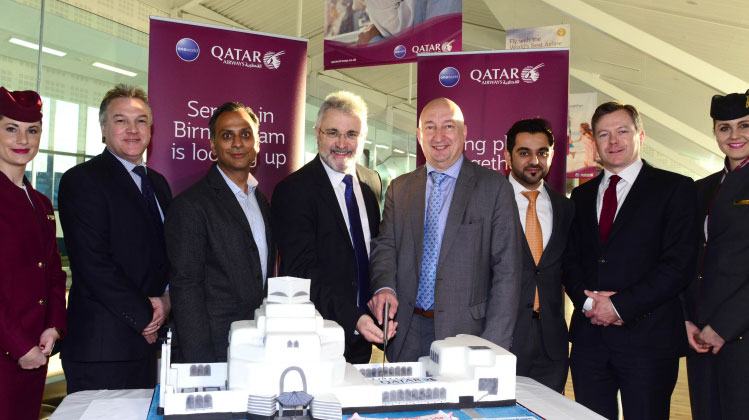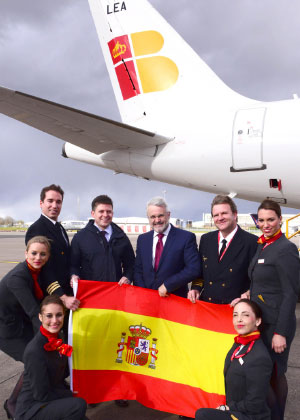
Qatar Airways launched an eight times weekly 787-8 service from its Doha hub to Birmingham on 30 March. “Connecting the economically vibrant West Midlands region with the rapidly developing capital city of Doha will be hugely beneficial to passengers at both ends of the route,” says Paul Kehoe, CEO Birmingham Airport.
Paul Kehoe, CEO Birmingham Airport, interviewed by Ross Falconer.
The vibrant West Midlands region is a hub of UK industry. Home to major manufacturers like Jaguar Land Rover, global connectivity is essential. Birmingham Airport is a vital cog in driving the Midlands engine for growth, providing the connectivity that the region’s thriving businesses need to trade, export and secure investment. Indeed, West Midlands’ aviation connectivity delivers £1.1 billion (€1.4bn) across the regional economy annually and supports over 25,000 jobs.
“The Midlands is a powerful engine of growth at the heart of our country and needs direct aviation to succeed,” comments Paul Kehoe, CEO Birmingham Airport.
The airport is working tirelessly with a proactive route development strategy to meet strong demand. Passenger numbers are up, with double-digit increases of 14% in April and 11% in May, meaning 15 consecutive months of growth. This builds on a record throughput of 10.2 million in 2015. “The figures are very encouraging and show that we are meeting the growing demand for long haul services,” Kehoe says. “Our teams are now focusing on raising awareness of the large selection of carriers and routes which serve Birmingham Airport, while continuing to work hard to attract even more new airlines to the region.”
Most recently, Turkish Airlines increased to double-daily on its Istanbul service, while Qatar Airways has launched an eight times weekly 787-8 service to Doha, and Emirates has increased its daily capacity by 15% with the introduction of a 615-seat A380 on its Dubai-Birmingham service.

Trevor Martin, Iberia Express’ Head of Revenue Management and Network, and Paul Kehoe, CEO Birmingham Airport, pictured with the crew of the inaugural Madrid-Birmingham service.
The low-cost carriers are also thriving at Birmingham. Wizz Air recently launched new routes to Sofia, Bucharest and Wroclaw; Vueling is adding to its successful Barcelona service with the launch of Alicante and Tenerife; Blue Air has introduced twice-weekly services to Bucharest; Norwegian has added new routes and increased frequencies; and Ryanair is increasing seat capacity by 40% for the winter 2016 schedule. Meanwhile, in April Iberia Express became Birmingham’s 11th new airline in the past year, with four weekly flights to Madrid.
“The exciting thing for me is that so many airlines are putting capacity into Birmingham, and we’ve just handled over one million passengers in the month of May for the first time,” Kehoe enthuses. “There are not many airports like Birmingham, which welcome about 50 airlines, with the smallest aircraft being a Jetstream 41 and the biggest a 615-seat A380.”
High-speed rail connectivity could be a further game-changer. The planned HS2 will see a new rail station – Birmingham Interchange – open in around 2026, which will be linked via people mover to the airport. It is forecast that this will enable Birmingham Airport to attract about 750,000 additional passengers.
Over the last 10 years, Birmingham Airport has invested more than £300 million (€380m) to develop its infrastructure, including a runway extension opened in 2014 to allow for more long haul aircraft movements. Building on continued double-digit growth, and increasing connectivity, it is maintaining an annual capital expenditure base of about £30 million (€38m). Current plans include a £20 million (€26m) investment in a new hold baggage screening system, and a new coaching lounge, which gives the airport more options with regards to bussing passengers to aircraft.
Looking further ahead, Birmingham Airport is also, at this moment, launching the optioneering exercise on its updated master plan to 2030, which Kehoe adds “will give us the direction of travel we need to consult on with the community towards the end of this year, and also enable us to inform and support HS2.”







